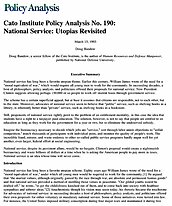The scheme has a certain superficial appeal, but at base it assumes that citizens are responsible, not to each other, but to the state. Moreover, advocates of national service seem to believe that “public” service, such as shelving books in a library, is inherently better than “private” service, such as shelving books in a bookstore.
Still, proponents of national service rightly point to the problem of an entitlement mentality, in this case the idea that students have a right to a taxpayer-paid education. The solution, however, is not to say that people are entitled to an education as long as they work for the government for a year or two, but to eliminate the undeserved subsidy.
Imagine the bureaucracy necessary to decide which jobs are “service,” sort through labor union objections to “unfair competition,” match thousands of participants with individual posts, and monitor the quality of people’s work. The incredible fraud, misuse, and waste endemic to other so-called public service programs hardly augur well for yet another, even larger, federal effort at social engineering.
National service, despite its persistent allure, would be no bargain. Clinton’s proposal would create a nightmarish bureaucracy and waste billions of dollars at a time when he is asking the American people to pay more in taxes. National service is an idea whose time will never come.


